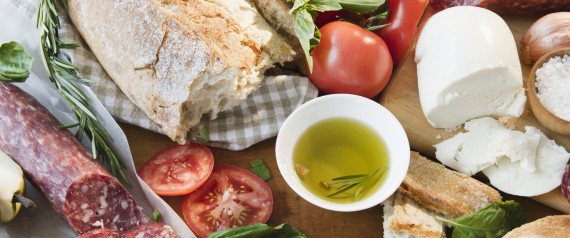by Fabio Parasecoli
from Huffington Post
Italy maintains a dazzling variety of products, now an important component of local identities. As a child, I distinctly remember that I was not aware of many fantastic products that I now love. Only later, was I exposed to the squash tortelli from Mantova, the smoked pork speck from Alto Adige, or the luscious burrata cheese from Apulia, as these specialties became readily available all over the country. At the same time, the friends I grew up with in Rome had no clue about the arrosticini (tiny grilled skewers of mutton) or the ventricina (ground pork and pork fat with spices, encased in a pig bladder) that I appreciated during my summer vacations in Abruzzo, just 100 miles away.
As I discuss in my new book Al Dente: A History of Food in Italy, culinary diversity has roots so deep in Italian culture that many wonder how to define Italian cuisine as a whole, or if it is even possible to do so. In his book Italy and its Invaders, historian Girolamo Arnaldi quotes poet Mario Luzi, saying, “Italy is an illusion, indeed, a mirage, the stuff of wishes” with a “terribly fragile” national identity. It is not easy to identify a set of ingredients, dishes, cultural attitudes and practices as generally Italian, although some items like pasta, pizza, parmigiano reggiano, and extra virgin olive oil have surpassed their geographical origins to be embraced all over the country. Rather than coherent and clearly codified, the Italian culinary repertoire is still — for the most part — a collection of interconnected but independent local traditions.
All around the world, as growing scores of food lovers are in search of novelty to express and expand their culinary knowledge and cultural capital, an establishment advertised as simply ‘Italian’ risks being perceived as passe or lacking in ‘authenticity.’ Savvy restaurant-goers, who have access to expert information and are likely to have traveled to Italy, have become acutely aware of the complexity of its local food traditions. The very existence of a national Italian cuisine is frequently called into question. In the United States, for instance, many restaurants started defining their food as ‘northern Italian’ as early as the late 1970s, distinguishing their cuisine from the seemingly old-school and immigrant-owned plain ‘Italian’ cooking, widely classified as southern Italian. In the 1980s, the craze for everything Tuscan exploded, fueled by media, travel agencies and marketing. Recently, the focus has shifted to once lesser-known culinary specialties from regions such as Apulia, Sardinia and Val D’Aosta, with renewed interest in local traditions of cities, towns and rural areas. This trend has been strengthened by the Italians’ own renewed interest in their local culinary identities, a phenomenon that since the end of the 1980s has deeply changed food preferences and practices in Italy.
The Italian-born cookbook author Marcella Hazan played a crucial role in changing the perceptions of English-speaking food enthusiasts about Italian food. When she moved to the U.S. in the mid-1950s, she found herself cooking for her husband, trying to recreate the flavors she had grown up with in her native Romagna. A biologist by training, she had never spent too much time at the family stove learning recipes from her mother or other female relatives. However, in her new environment, she rediscovered her passion for food. After The New York Times food critic Craig Claiborne noticed her work, she published The Classic Italian Cook Book in 1973 and More Classic Italian Cooking in 1978. The two books, collected in one volume in 1992 under the title Essentials of Classic Italian Cooking, are still considered by many as groundbreaking.
We will discuss the work and influence of Marcella Hazan in a panel discussion at The New School on June 4, part of the Culinary Luminaries series. Panelists include Victor Hazan, Marcella’s husband and professional collaborator, Susan Friedland, former Director of Cookbook Publishing and Marcella’s editor at HarperCollins, cookbook author Michele Scicolone and the Italian chef Cesare Casella.

